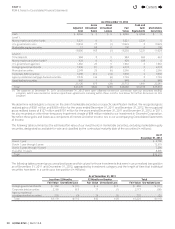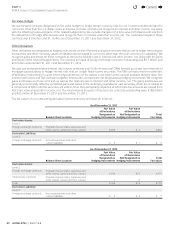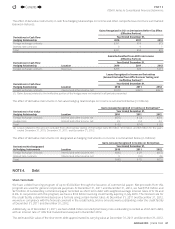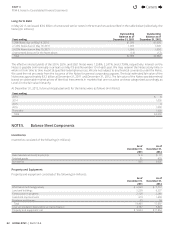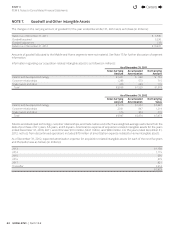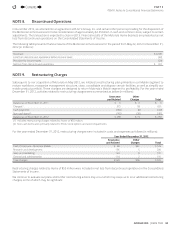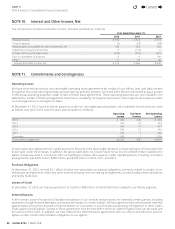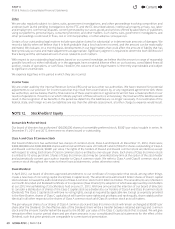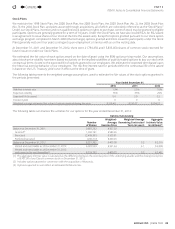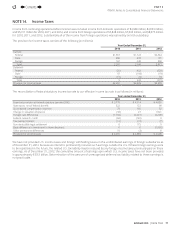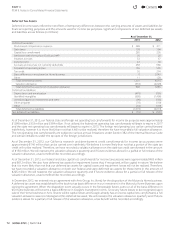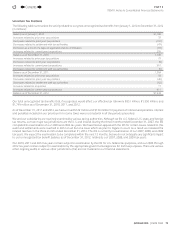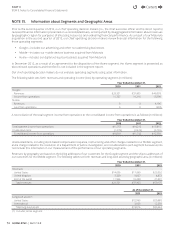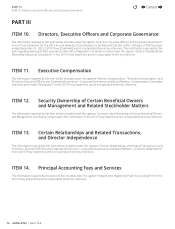Google 2012 Annual Report Download - page 73
Download and view the complete annual report
Please find page 73 of the 2012 Google annual report below. You can navigate through the pages in the report by either clicking on the pages listed below, or by using the keyword search tool below to find specific information within the annual report.
67GOOGLE INC. |Form10-K
PART II
ITEM8.Notes to Consolidated Financial Statements
It is not possible to make a reasonable estimate of the maximum potential amount under these indemnifi cation agreements
due to the unique facts and circumstances involved in each particular agreement. Additionally, we have a limited history of prior
indemnifi cation claims and the payments we have made under such agreements have not had a material adverse eff ect on
our results of operations, cash fl ows, or fi nancial position. However, to the extent that valid indemnifi cation claims arise in the
future, future payments by us could be signifi cant and could have a material adverse eff ect on our results of operations or cash
fl ows in a particular period. As of December31, 2012, we did not have any material indemnifi cation claims that were probable
or reasonably possible.
Legal Matters
Antitrust Investigations
In June2011, we received a Civil Investigative Demand (CID) from the U.S. Federal Trade Commission’s (FTC) Bureau of Competition
and a subpoena from the FTC’s Bureau of Consumer Protection relating to a review by the FTC of our business practices, including
search and advertising. In June2012, we also received a CID and a subpoena duces tecum from the FTC’s Bureau of Competition
seeking documents and information broadly related to Motorola’s licensing practices for standards-essential patents and use of
standards-essential patents in litigation. In January2013, the FTC closed its investigations into our business practices, including
search and advertising. In connection with the closing of the investigation, we have voluntarily agreed to make certain product
changes. In addition, we and Motorola have entered into a consent order with the FTC setting forth certain guidelines on our use
of standards-essential patents in litigation.
State attorneys general from the states of Texas, Ohio, and Mississippi have issued similar CIDs relating to our business practices.
We are cooperating with the state attorneys general and are responding to their information requests on an ongoing basis.
The European Commission’s (EC) Directorate General for Competition has also opened an investigation into various antitrust-related
complaints against us. Since February2010, we have received a number of notifi cations from the EC about antitrust complaints
fi led against us. On November30, 2010, the EC formally opened proceedings against us. We believe we have adequately responded
to all of the allegations made against us. We continue to cooperate with the EC and are pursuing a potential resolution that
would avoid a fi nding of infringement and a fi ne. The EC has also opened an investigation into Motorola’s licensing practices for
standards-essential patents and use of standards-essential patents in litigation on the basis of complaints brought by Microsoft
and Apple. We are cooperating with the EC and responding to the information requests on an ongoing basis.
The Comision Nacional de Defensa de la Competencia in Argentina, the Competition Commission of India, and the Korea Fair
Trade Commission in South Korea have also opened investigations into certain business practices.
EPA Investigation
In February2009, we learned of a U.S. Environmental Protection Agency (EPA) investigation into an alleged release of refrigerant
at one of our smaller data center facilities, which we acquired from DoubleClick, and the accuracy of related statements and
records. We are cooperating with the EPA and have provided documents and other materials.
Patent and Intellectual Property Claims
We have had patent, copyright, and trademark infringement lawsuits fi led against us claiming that certain of our products, services,
and technologies, including Android, Google Search, Google AdWords, Google AdSense, Google Books, Google News, Google
Image Search, Google Chrome, Google Talk, Google Voice, Motorola devices and YouTube, infringe the intellectual property rights
of others. Adverse results in these lawsuits may include awards of substantial monetary damages, costly royalty or licensing
agreements, or orders preventing us from off ering certain features, functionalities, products, or services, and may also cause us
to change our business practices, and require development of non-infringing products or technologies, which could result in a loss
of revenues for us and otherwise harm our business. In addition, the U.S. International Trade Commission (ITC) has increasingly
become an important forum to litigate intellectual property disputes because an ultimate loss for a company or its suppliers in
an ITC action could result in a prohibition on importing infringing products into the U.S. Since the U.S. is an important market, a
prohibition on importation could have an adverse eff ect on us, including preventing us from importing many important products
into the U.S. or necessitating workarounds that may limit certain features of our products.
Furthermore, many of our agreements with our customers and partners require us to indemnify them for certain intellectual
property infringement claims against them, which would increase our costs as a result of defending such claims, and may require
that we pay signifi cant damages if there were an adverse ruling in any such claims. Our customers and partners may discontinue
the use of our products, services, and technologies, as a result of injunctions or otherwise, which could result in loss of revenues
and adversely impact our business.
In December2012, we announced that Motorola Mobility had entered into an agreement with Arris Group, Inc. and certain other
persons providing for the disposition of Motorola’s Home business for total consideration of approximately $2.35billion, subject to
certain adjustments. Under the agreement, we have agreed to indemnify Arris Group for potential liability from certain intellectual
property infringement litigation, including, among others, a patent infringement claim brought by TiVo relating to certain digital
video recording equipment sold by Motorola Mobility.
4
Contents
4



